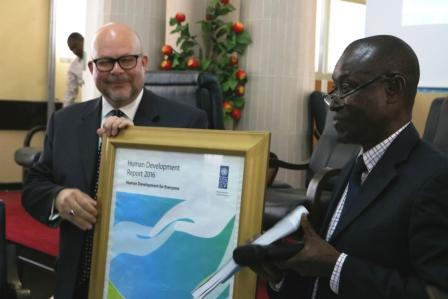Going beyond GDP, UNDP proposes human development measure of sustainability
Rio de Janeiro, Brazil, 20 June 2012—In a high-level forum at the UN Conference on Sustainable Development today the United Nations Development Programme (UNDP) presented the conceptual groundwork for a future “Sustainable Human Development Index,” which would recognize the cost of human development to future generations.
The UNDP forum was prompted by the call made by many in Rio for a UN-led examination of alternatives to purely economic measurements of national and global progress, said UNDP Administrator Helen Clark, who moderated today’s panel discussion.
Among other featured speakers at today’s forum – titled “Beyond GDP: Measuring the Future We Want” – were President Michael Chilufya Sata of Zambia and Prime Minister Helle Thorning-Schmidt of Denmark, holder of the European Union’s rotating presidency.
Following the dialogue with these world leaders, experts discussed the implications of the UNDP proposal, including Roberto Bissio, Coordinator of Social Watch, the civil society consortium; Mary Barton-Dock, head of the World Bank’s Environment Department; and Enrico Giovannini, head of Italy’s National Office of Statistics and former chief statistician for the Organisation of Economic Cooperation and Development (OECD).
“Equity, dignity, happiness, sustainability – these are all fundamental to our lives but absent in the GDP,” Helen Clark said today. “Progress needs to be defined and measured in a way which accounts for the broader picture of human development and its context.”
The sustainability measurement project by UNDP’s Human Development Report Office represents a continuation of its work over two decades, beginning with its Human Development Index (HDI), a composite measure of health, education and income that has become a widely accepted alternative to GDP for assessing countries’ progress. Noted The New York Times on the 20th anniversary of the Human Development Report in 2010: “So far only one measure has succeeded in challenging the hegemony of growth-centric thinking. This is known as the HDI, which turns 20 this year.”
Earlier this year, in its report Resilient People, Resilient Planet, UN Secretary-General Ban Ki-Moon’s High-Level Global Sustainability Panel concluded that “the international community should measure development beyond GDP and develop a new sustainable development index or set of indicators.”
As noted at today’s forum, the need for better approaches to measuring progress has been endorsed by other international institutions and opinion leaders, including the OCD’s Better Life Initiative and the Stiglitz-Sen-Fitoussi Commission, which called for a broad range of social indicators to complement GDP figures.
The UN Statistical Office’s System of Environmental-Economic Accounting, the World Bank’s partnership for Wealth Accounting for Valuation of Ecosystem Services, and the Inclusive Wealth Index, newly-released by the United Nations Environment Programme and the United Nations University are among other recent multilateral initiatives incorporating environmental factors into economic assessments of national and global progress.
Negotiations prior to the Rio +20 conference echoed that view, with the final conference declaration submitted for adoption by UN members stating: “We recognize the need for broader measures of progress to complement GDP in order to better inform policy decisions, and in this regard, we request the UN Statistical Commission, in consultation with relevant UN System entities and other relevant organizations, to launch a programme of work in this area building on existing initiatives.”
In a presentation to the Rio forum today, Khalid Malik, the director of UNDP’s Human Development Report Office, reviewed the advantages as well as the challenges in measuring sustainability from a people-based, human development perspective. The conceptual framework for an HDI-based assessment of sustainability reflects the human development concept of intergenerational equity, based on principles of global justice and rooted in the premise that choices made today should not limit choices available to people in the future. The people-centred, HDI-based approach to assessing sustainability also incorporates the idea of planetary thresholds, showing how climate change in particular is already posing severe long-term human development risks, most acutely in poor nations and poor communities.
“From a policy perspective, this implies that the right to current development is fundamental but it must be achieved without reducing the choices available to future generations,” Malik said.
Concerns about sustainable human development have been emphasized consistently UNDP’s Human Development Reports over the past two decades. The 1994 Report articulated the underlying UNDP principle of sustainable human development: “The purpose of development is to create an environment in which all people can expand their capabilities, and opportunities can be enlarged for both present and future generations.”
The HDI’s originators – the late Pakistani economist Mahbub ul-Haq and his collaborator Amartya Sen, the Nobel laureate economist of India – devised the index as a readily comprehensible people-based assessment of progress that puts health and education on par with economic growth. Since 1990, the UNDP Human Development Report’s annual HDI rankings have been widely followed by governments, media, civil society and development experts around the world. The HDI has also been adopted for planning purposes on the national and local level in many countries, including India, Mexico, Morocco, and the Philippines.
“UNDP believes that the Human Development Index could be a starting point for a more comprehensive measure of sustainable development,” Helen Clark said today, emphasizing the need for further research and consultations with governments, civil society and academic experts in the field, in collaboration with other UN agencies and multilateral institutions.
Stay with Sierra Express Media, for your trusted place in news!
© 2012, https:. All rights reserved.





